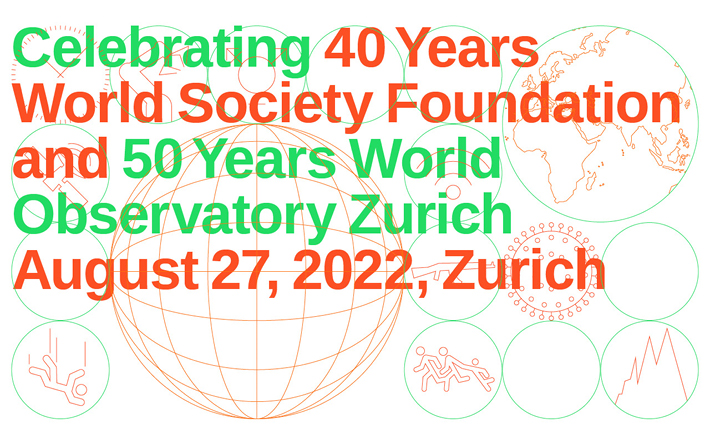conferences 2023
Upcoming conferences 2024
1 Global Disasters and World Society hybrid conference at University of Santa Catarina, Florianopolis, Brazil, live and remote conference: March 25 to 27, 2024.
2 The Political Economy of Migration University of Duisburg
Looking back to Celebrating 40 Years of World Society Foundation
1. After Globalization: The Future of World Society
World Society Foundation, Zurich, Switzerland
August 25–26, 2022 – International Online Conference
final program and registration
August 27, 2022 – In-person Celebration Event:
Program of conferences and of the celebration event 27/8/22 and registration under 6
https://forms.office.com/Pages/ResponsePage.aspx?id=2zjkx2LkIkypCsNYsWmAs6410Nmh3RNJok7_yrNMD4VUQ0FONkdUMU1VRUJOR0FZN0tZWE01OU9LSy4u
2. Overcoming Divides for a Green Global Europe
 Instituto Universitário de Lisboa, Lisbon, Portugal
Instituto Universitário de Lisboa, Lisbon, Portugal
June 20–22, 2022 – Virtual Sessions
June 29–July 1, 2022 – In-person Sessions
https://councilforeuropeanstudies.org/2022-conference-keynote/
https://councilforeuropeanstudies.org/2022-final-programs/
WSF cohort Lisbon presentations
Upcoming Publications
After Globalization - The Future of World Society
The edition of the special celebration volume including the conference papers of World Society has started.
Publications
Democratic Struggles in Challenging Times: Insights from Mongolia and Around the World
Edited by Christian Suter, Stephen Brown, Dolgian Aldar, and Tamir Chultemsuren
Ulaanbaatar, Mongolia: IRIM/WSF, 2022
The link to the Mongolian book
African-Asian Relations: Past, Present, Future
Edited by Patrick Ziltener and Christian Suter
World Society Studies, volume 2022
European Studies. Past, Present and Future
Edited by Erik Jones, 2020, Agenda Publishing, 240 pages
To see the contents of the volume, click here: Contents
For additional information and order, please visit the publisher's website: Agenda Publishing
The Middle Class in World Society: Negotiations, Diversities and Lived Experiences
Edited by Christian Suter, S. Madheswaran, and B.P. Vani
London/New York: Routledge, 2020
To see the contents of the volume, click here: Content
For additional information and order, please visit the publisher's website: Routledge
The Return of Geopolitics
World Society Studies, volume 2018
Available free electronic version Preprint Version of the book.
To see the flyer of the volume, click here: Flyer
To see the contents of the volume, click here: Contents
To order the book, click here: Order Book
Overcoming Global Inequalities
Political Economy of the World-System Annuals, Volume XXXIV, 2015
To see the contents of the volume, click here: Contents
For additional information and order, please visit the publisher's website: Paradigm Publishers
Structures of the World Political Economy and the Future Global Conflict and Cooperation
World Society Studies, volume 2014
To see the flyer of the volume, click here: Flyer
To see the contents of the volume, click here: Contents
To see the introduction of the volume, click here: introduction
To order the book, click here: Order
World Society in the Global Economic Crisis
World Society Studies, volume 2011
To see the contents of the volume, click here: Contents
To see the introduction of the volume, click here: Introduction
To order the book, click here: Order
The Global Economic Crisis : Perceptions and Impacts
Special Issue of the Swiss Journal of Sociology, volume 37, issue 2, 2011
To see the contents of the special issue, click here : Contents
To access the electronic version of the special issue, click here :SJS archives
Inequality Beyond Globalization : Economic Changes, Social Transformations,
and the Dynamics of Inequality
World Society Studies, Volume 2010
To see the cover and the contents of the book, click here : cover contents
To order the book for customers outside North America, click here: order



